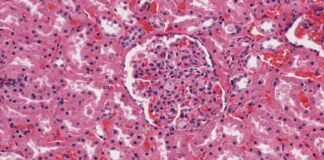Pregnancy Complications from Parvovirus Infection: Risks and Precautions for Expecting Mothers
Abby Parks, a 27-year-old special education teacher in Springfield, Illinois, had never heard of parvovirus until she started experiencing flu-like symptoms in late April. At about 18 weeks pregnant, she began to feel very sick, with a fever that persisted for days. Despite testing negative for Covid and strep, Parks’ symptoms worsened, with joint pain and a rash. Concerned about the possibility of an infection, the school nurse, who had observed students with red cheeks, suggested that Parks might have parvovirus B19.
As her condition deteriorated, Parks was bedridden with a fever for several days until blood tests conducted by her OB-GYN revealed that she was indeed infected with parvovirus B19. This diagnosis led her to be referred to a maternal fetal medicine specialist, who discovered that the virus had been transmitted to the fetus in utero, causing it to develop anemia, a potentially life-threatening condition. In a risky procedure, doctors performed a blood transfusion on the fetus while still in the womb to address the issue.
The rise in cases of parvovirus B19, also known as Fifth disease or “slapped cheek syndrome,” has prompted the Centers for Disease Control and Prevention (CDC) to issue an alert to healthcare providers to be vigilant for signs of the highly contagious virus. While most infections occur in children aged 5 to 9, there has been an increase in cases among adults, particularly pregnant individuals and those with sickle cell disease who have not previously been exposed to the virus.
Dr. Kathy Bligard, an OB-GYN at Washington University Hospital in St. Louis, emphasized the risks of parvovirus B19 to pregnant women, as the virus can cross the placenta and infect the fetus, leading to severe complications such as anemia and potential fetal death. Despite having recovered from the virus herself, Parks’ pregnancy remained in jeopardy, as subsequent ultrasounds revealed that the fetus was not receiving adequate blood supply from the placenta.
As a result, Parks was admitted to a hospital in Springfield for further monitoring and care. Dr. Bligard explained that parvovirus B19 impairs the fetus’s ability to produce new red blood cells, which can result in heart failure or even death due to low blood counts. While most cases of Fifth disease in children are mild and resolve on their own, infections in pregnant women can have serious consequences, underscoring the importance of early detection and intervention.
Subheadings:
The Spread of Parvovirus B19: A Growing Concern
Pregnancy Complications and Risks Associated with Parvovirus Infection
Symptoms, Diagnosis, and Treatment of Fifth Disease
Dr. Vincent Iannelli, a pediatrician in the Dallas area, noted an increase in cases of Fifth disease, with one to two cases per week compared to the typical frequency of one case per month. While the infection is more prevalent in the spring and summer months, pregnant women should be vigilant for symptoms such as joint pain and anemia, as prompt medical attention is crucial in preventing serious complications for both mother and baby.
Although Fifth disease is generally mild in children, pregnant women who have not been previously exposed to the virus are at higher risk of developing severe symptoms. The distinctive rash associated with the infection typically appears after other symptoms such as fever and respiratory issues, indicating that the individual is no longer contagious. However, pregnant women experiencing joint pain or difficulties in red blood cell production should notify their healthcare providers immediately.
The term “Fifth disease” stems from a historical classification of childhood rashes, with parvovirus B19 designated as the fifth on the list. While the numbering system is no longer in use, Fifth disease remains a significant concern for pregnant women due to its potential impact on fetal health. Parks, now at 30 weeks gestation, continues to be closely monitored for any signs of fetal distress or anemia, highlighting the importance of awareness and proactive management of parvovirus B19 in pregnancy.
In conclusion, the rise in cases of parvovirus B19 underscores the need for increased vigilance among healthcare providers and pregnant women alike. Early detection, prompt intervention, and close monitoring are essential in mitigating the risks associated with Fifth disease and protecting the health of both mother and baby. By raising awareness and promoting proactive healthcare practices, maternal fetal specialists and obstetricians can work together to ensure the best possible outcomes for pregnant individuals affected by parvovirus B19.


















